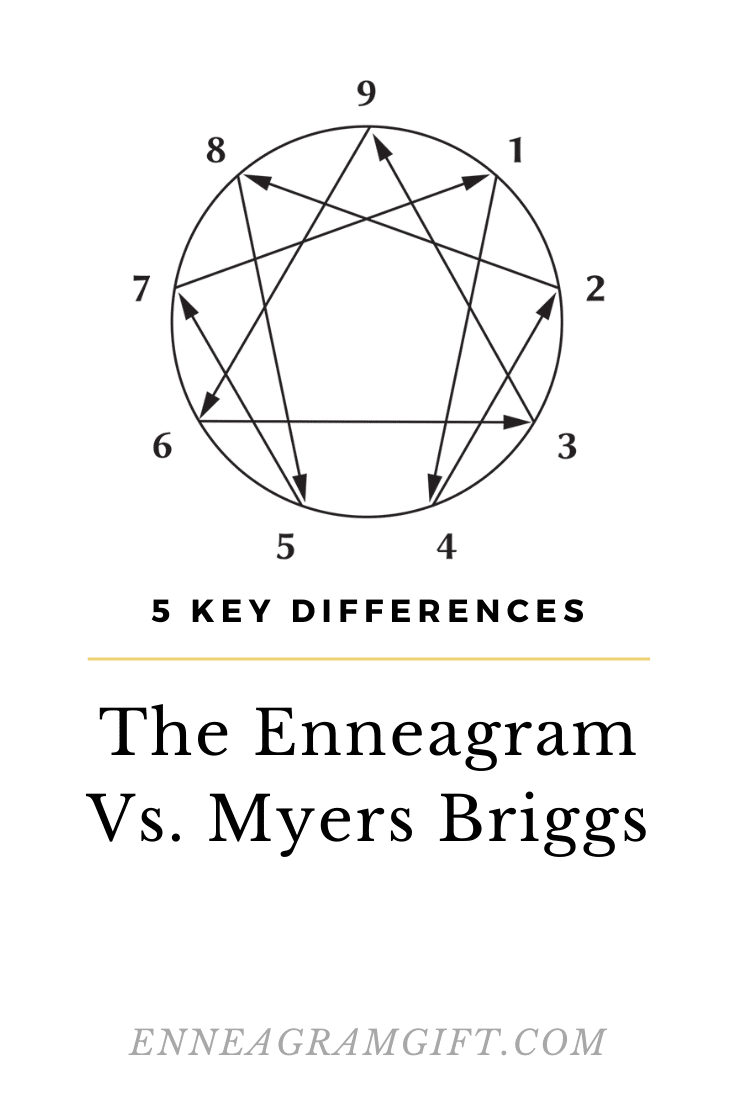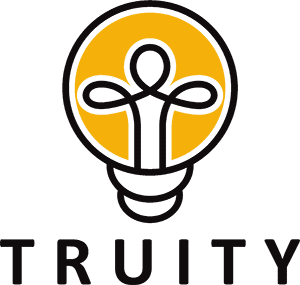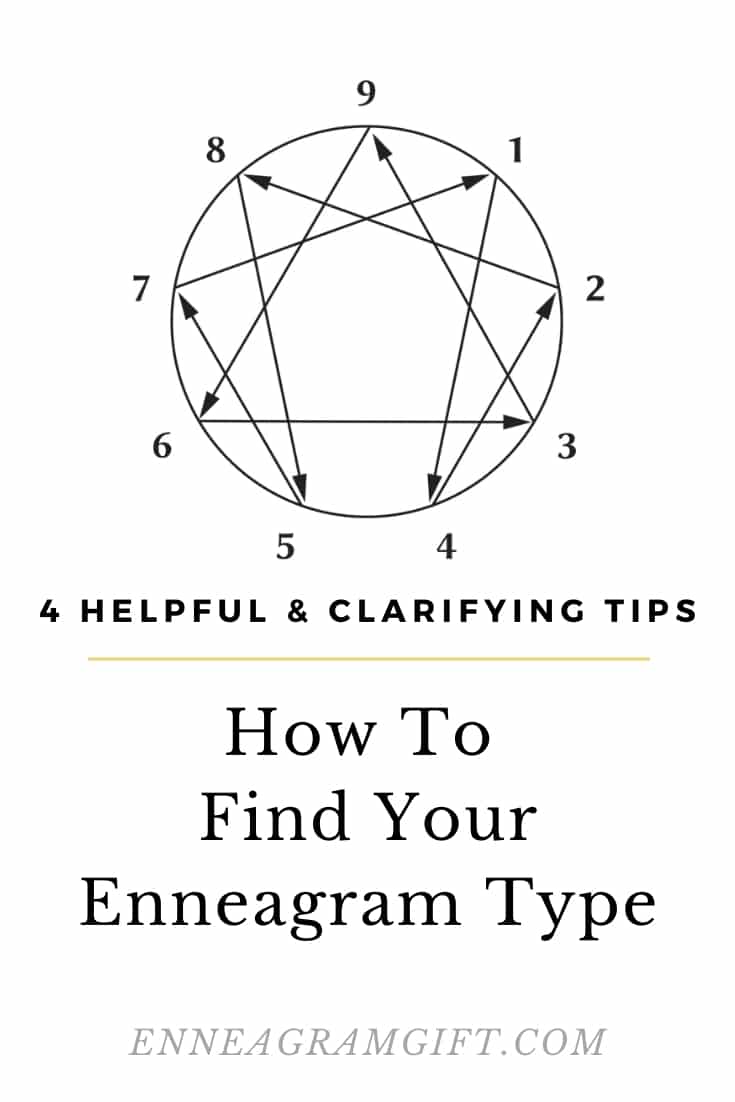The Enneagram and Myers Briggs personality tests are two of the most popular. Both have pros and cons and can be highly effective personality indicators. But what exactly is the difference between the two?
Enneagram and Myers Briggs are different in that the Enneagram focuses more on the development process, and Myers Briggs focuses more on the nature of personality. Some Enneagram teachers believe that personality types emerge during early childhood years, while the Myers-Briggs system argues that type is purely inherent.
If you’re still unsure which personality indicator to use, read on! Below is helpful information on the differences between the two and the pros and cons.
Enneagram Vs Myers Briggs: Understanding The Differences
As mentioned before, the main difference between MBTI and the Enneagram is their central framework. The Enneagram focuses on nurturing personality types, while MBTI focuses on inborn personality types and traits. You may want to know about a few other differences to further your understanding.
MBTI is commonly known as a more analytical system than the Enneagram. Dr. Carl Jung (whose theory is at the core of MBTI) was a practitioner of psychoanalysis and subsequently had a critical, analytical mind. Katharine Briggs chose to employ this analytical characteristic when she created the MBTI.
The Enneagram assigns nine basic personality types rather than breaking personalities into several categories and traits. There are fewer personalities that embody many more characteristics. MBTI has almost twice as many personality types that embody fewer traits. Also, the Enneagram is known to be more holistic or less structured than MBTI.
5 Key Differences Between Enneagram Vs MBTI:
- The Enneagram explains motivations as the source of type
- Myers Briggs details personality traits “as is.”
- The Enneagram diagram focuses on nine personality types
- Myers Briggs is based on 16 personality types
- The Enneagram provides more nuance when describing personality traits
- Myers Briggs is more rigid when describing individual traits
- The Enneagram helps explain patterns in motivation, emotion, and thought
- Myers Briggs reveals associates personality with an individual’s preferences
- The Enneagram reveals a “stance,” or in other words, how you typically interact with others to achieve what you want
- Myers Briggs describes characteristics or traits in social settings
The Enneagram System in Detail
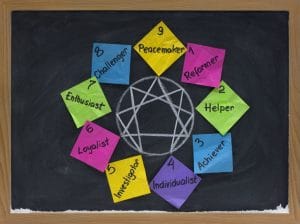
The Enneagram system is a system/method of personality typing. It describes and maps out patterns of emotions that affect how people view the world. The Enneagram has mapped out nine different personality types, each of which fits into one of three Triads: the Heart Type, the Head Type, and the Body Type.
Discovering and following a person’s Enneagram type helps us to understand how a person views the world and why they might view it that way. The Enneagram can help explain how an individual’s core beliefs could create a bit of bias, blindness, or limit a person’s ability to be open-minded.
Each Enneagram type has its own set of core beliefs and influences, and these are the things that shape each personality type’s worldview and way of thinking. Below is a very brief introduction to each enneagram personality type!
Type One: The Perfectionist (Body Type). As you may have guessed, Ones place heavy emphasis on following the rules and doing things correctly all the time. They fear being imperfect and are often strict with themselves and others about getting things done right.
Type Two: The Giver (Heart Type). Type Two Enneagrams are givers, which means they fear being unloved and unliked. Twos are willing to go the extra mile to find ways they can be helpful to those around them. They have a powerful desire to fit in and find a place where they belong in life and society.
Type Three: The Achiever (Heart Type). Type Threes are, as you guessed, ambitious. Threes are very conscious of their public image and strongly care about how others view them. They worry about not being seen as valuable to others, and more than anything else, they fear failure.
Type Four: The Individualist (Heart Type). Fours value their uniqueness deeply, and they have a strong desire to experience deep and authentic emotions. More than anything, Fours fear being flawed, and they focus overly on how they are different from other people in the world.
Type Five: The Investigator (Head Type). Above all else, Type Fives seek knowledge and understanding of things and their world. Fives tend to be much more comfortable with data and information than others. They deeply fear being overwhelmed by the needs of others or even of themselves.
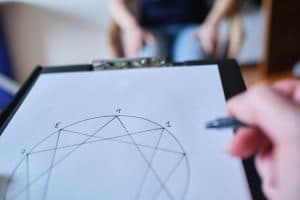
Type Six: The Loyalist (Head Type). Sixes can obsessively over-prepare for any problem and seek security in every aspect of life. Type Sixes deeply fear being unprepared for anything and everything that might come their way. They also fear being unable to protect themselves from danger.
Type Seven: The Enthusiast (Head Type). Sevens fear being lonely, sadness, and experiencing emotional pain. Because of this, Sevens actively seek to stay busy. They are constantly on the lookout for the next fun thing/the next adventure. They quickly become bored and like to spend time planning the next activity they will do.
Type Eight: The Challenger (Body Type). Type Eights are deeply afraid of being powerless. They desire power and are willing to stand up for their beliefs. Subsequently, they focus significantly on being in charge and controlling their environment.
Type Nine: The Peacemaker (Body Type). Type Nines are an extremely laidback personality type. Nines like to go with the flow and let other people take charge and make all decisions. Because of this, Nines tend to be a bit more passive than the different types. Nines fear pushing other people away due to prioritizing their own needs.
Enneagram & Myers Briggs Tests
Do you want to take an Enneagram Test?
The Truity Enneagram Test is the test I recommend the most.
Click Here To Take The Truity Enneagram Test!
If you’d like to find more reputable free Enneagram tests, check out The Top 4 Best Free Enneagram Tests Online.
Do you want to take the Myers Briggs Test?
Truity also offers a Myers Briggs Test. Click Here To Take The Truity Myers Briggs Test!
The Myers-Briggs System in Detail
The Myers-Briggs Type Indicator (also referred to as MBTI) is a personality type indicator that focuses on typological psychology. It was developed by Katharine Cook Briggs and her daughter Isabel Briggs Myers in 1943.
While the Enneagram system focuses on personality development during early childhood experiences, Myers-Briggs focuses on inborn personality types. The Myers-Briggs framework is based on the typological theory of Carl Jung.
Rather than having nine different personality types, Myers-Briggs has four categories with 16 personality types.
These categories are as follows: Analysts, Diplomats, Sentinels, and Explorers.
Analysts are known well for their intelligence, impartiality, rationality, and intellectual excellence.
Diplomats are known to be passionately idealistic, empathetic, and diplomatic. Unlike Analysts, Diplomats are intuitive and feeling personalities.
Sentinels are known for their practicality, security, stability, and intense focus on order. Sentinels are the judges and the observant personalities. They are well known for making and keeping the rules.
Explorers are, as their name suggests, adventurous. They are observant and prospecting, always looking for the next adventure or big thing. Explorers are known for being flexible, spontaneous, and ingenious.
These four categories are all unique and have something special to offer. Now that we know what these categories are, let’s dive in and look at each personality type within those categories.
Myers Briggs Personality Types
The Analyst Category
As mentioned above, Analysts are known for being rational, impartial, and intellectually robust. There are four personality types grouped into this category: Architects, Logicians, Commanders, and Debaters. Architects are at the top of the list as the rarest personality type.
Architects are incredibly bold and capable, but it is sometimes difficult for other people to keep up with them. Witty and rational thinkers, Architects can either be the biggest dreamers or the biggest pessimists. Whatever an Architect sets their mind to, they will accomplish it.
Logicians are people who rarely ever stop thinking, so don’t be surprised if you know a logician who is currently getting lost in thought. Logicians pride themselves on being unique and flexible thinkers.
They are imaginative and curious and can often be depended upon to be fascinated with the inner workings of their minds. Logicians have a reputation for being detached and passive on the outside, simply because their minds go a million miles an hour.
Unlike Logicians, Commanders are very extraverted Analysts. Commanders are decisive, and they deeply value action, momentum, and accomplishment. They are excellent at using the information to construct visions for the future and then quickly act on those visions.
Commanders are natural-born leaders who project charisma, authority, and confidence in everything they do. They have the uncanny ability to draw a crowd together and unite them behind a common cause.
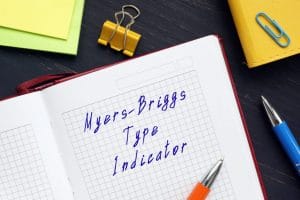
As you may have guessed, Debaters are extraverted and extremely bold. They enjoy sparring mentally because it gives them a chance to exercise their incredibly sharp wit. If you know anybody who is a hopeless devil’s advocate, they are most likely a Debater.
Debaters will wear themselves out arguing over something, even if they don’t necessarily agree with it (if it means stepping into another’s shoes). They are uncompromisingly honest individuals who work hard to understand those around them.
The Diplomat Category
Diplomats are best known for being intuitive and emotional individuals who connect well with others. Advocates, the first members of the Diplomat family, are deeply thoughtful and imaginative, highly complex people. Because their personality type embodies so many different traits,
Advocates can be bold and passionate when standing up for their beliefs. Still, they can also be soft-spoken and understated. Advocates are willing to dream big and act on those dreams.
Mediators are introverted and intuitive individuals who seem quiet and unassuming but have vibrant inner lives. Mediators are imaginative and very creative. Logicians get lost in their thoughts, and Mediators get lost in daydreams and stories they create in their minds. Mediators are idealistic and empathetic people who have deep emotional connections to nature and the arts. They desire to experience deep and meaningful relationships.
Protagonists are warm and forthright people who have strong ideas and values and love helping others. Protagonists often feel that they are meant to live for a higher purpose. They are romantic and creative, and they rarely, if ever, shy away from an opportunity to do the right thing. They find fulfillment in following their dreams, helping others, and paving the way for others to follow. Protagonists are natural-born leaders who are never happier than when they are inspiring people.
Finally, we have the Campaigners. As with all Diplomats, Campaigners have big ideas and big dreams, and they care deeply about other people. They are free spirits; they are often the life of the party and love to have a good time. However, their personality types and desires run deeper than just wanting to party. They have a genuinely strong desire to develop deep and meaningful connections with other people and are devoted to enriching those relationships.
The Sentinels Category
Sentinels are up next for the MBTI. Known for being observant and practical, Sentinels are always looking for ways to make rational conclusions.
Firstly, we have the Logistician. Logisticians are known to plan and methodically carry out their actions carefully. Everything a Logistician does has a purpose and has been thoroughly thought out. Logisticians take great pride in their work and are known to be very rational.
Defenders are warm and unassuming people who are efficient and responsible. This efficiency leads them to give careful attention to small details in their lives. They believe that the only way to grow love is by sharing it. Though Defenders can be pretty reserved, they have well-developed people skills and tend to be well-rounded individuals.
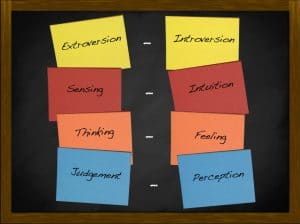
Executives are people who possess great fortitude. They are representatives of tradition and order and are commonly known to utilize their knowledge of right and wrong whenever they possibly can. They tend to follow their own judgment best, and they often act as stabilizing forces among others, offering them a solid sense of direction.
People with Consul personality types are incredibly people-focused. They are achievement-minded and decisive, and they are always happy to offer guidance to others who may be in desperate need of it. Nothing makes a Consul more comfortable than when they can be attentive and participate in their social community.
The Explorer Category
Explorers are adventurous, spontaneous, and prospective individuals. Virtuoso personality types are usually introverted and individualistic. They are willing to pursue their dreams and goals without much need for external connection. They will pave their way but are always ready to adjust their approach or technique. They love to explore with their hands and their eyes.
Adventurers, though they may be introverted, are extremely open-minded people. They like to live in the moment and unlock any exciting potentials that may be waiting for them there. They take everything on with a sense of grounded warmth. Adventurers are the true artists of the world.
If you are an Entrepreneur, that probably means you are energetic, social, and action-oriented. They take everything as it comes and can navigate anything they face deftly. Entrepreneurs are almost always the center of attention and the life of the party. They love to have a good time.
Last but not least, we have our Entertainers. Entertainers are as adventurous and spontaneous as they come. They are known to start enjoying and taking part in life early on. They are known to encourage others to participate in shared activities and are as bright and bubbly as a person could be. Entertainers take pleasure in discovering the wonders of the unknown, and they are constantly leaping off into it.
Enneagram Vs Myers Briggs Conclusion
Questions about the Enneagram Vs. Myers Briggs need not focus on which is more accurate; both typing systems can pinpoint relatable attributes. Both resources are helpful and can help individuals in unique ways.
Ultimately, the Enneagram is exploratory and can help identify key motivations and markers in one’s life that has shaped their personality. Myers Briggs can help individuals associate with common traits and identify with others who have similar characteristics.
Still interested in comparing the Enneagram Vs. Myers Briggs? You can take both tests and consider the similarities and differences:
Click Here To Take The Truity Enneagram Test!
Click Here To Take The Truity Myers Briggs Test!

